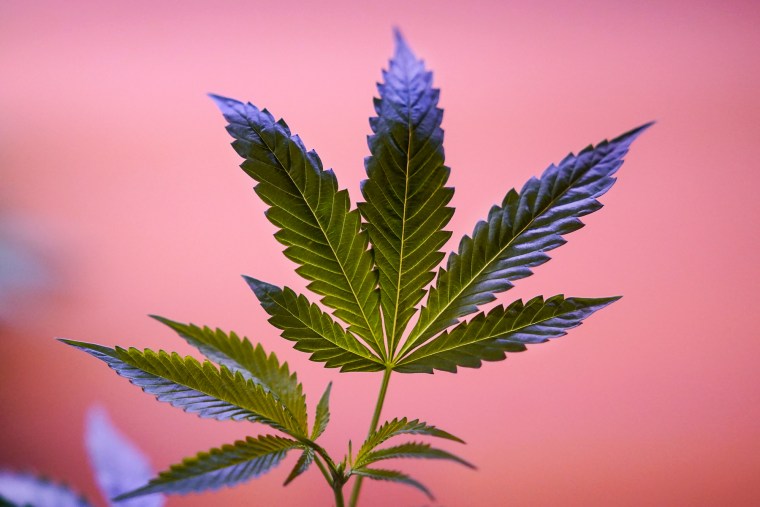WASHINGTON — Some of the nation’s largest veterans groups are pushing the Biden administration to “expeditiously” ease federal restrictions on marijuana, joining a growing number of calls to reschedule the drug six months after the Department of Health and Human Services recommended doing so.
In a letter first obtained by NBC News, veterans groups urged the Justice Department, which oversees the Drug Enforcement Administration, to act quickly.
“The men and women who served in the U.S. Armed Forces often face difficult physical and mental challenges upon returning home,” wrote the groups, which include the Iraq and Afghanistan Veterans of America, AMVETS, American GI Forum, the American Legion, Blinded Veterans Association, and the Minority Veterans of America. “As such, we hope that in treating the wounds of war — both visible and invisible — that our servicemembers and veterans would have access to the widest array of possible treatments.”
Cannabis is currently classified as a Schedule 1 drug, which means it has a high potential for abuse and no accepted medical use in treatment, alongside substances like heroin. The Department of Health and Human Services has recommended rescheduling it to Schedule 3, which is far less restrictive.
President Joe Biden ordered a review of federal marijuana policy in October 2022, and a formal decision from the DEA is expected soon, potentially in the coming weeks, according to two people with knowledge of plans.
Though the Department of Veterans Affairs is prohibited from denying health services to veterans who use marijuana in states where it is legal, the agency does not offer medical marijuana as a treatment for veterans or pay for medical marijuana prescriptions from any source — even in the more than 40 states where cannabis is legal in some form. Last summer, the VA and the Defense Department released a joint recommendation against the use of marijuana for the treatment of post-traumatic stress disorder.
But the veterans groups wrote that their members want the option, citing a survey conducted by the American Legion in which 82% of respondents said they want medical cannabis as a federally legal treatment option.
The groups said that without the ruling from the DEA, “many veterans remain uncomfortable discussing cannabis use with their VA providers due to fear of retribution.”
“We understand that the administrative scheduling process involves several steps, but the sooner the DEA moves forward with a reclassification of cannabis, the sooner it could potentially be integrated into the [Veterans Health Administration] — our nation’s largest healthcare system,” they wrote.
The letter follows increasing momentum in Congress to adjust federal cannabis policy. Lawmakers in both chambers and both parties introduced a slew of bills related to veterans and cannabis over the last year, including legislation that would allow VA doctors to recommend medical marijuana to their patients in states where it is legal, and a separate bill that would mandate that the VA study various effects of cannabis on veterans with chronic pain and PTSD.
A major, bipartisan package passed out of the Senate Veterans' Affairs Committee, chaired by Sen. Jon Tester, D-Mont., last year but was ultimately blocked by Republicans on the floor.
Voters increasingly favor legalizing marijuana. A Gallup Poll conducted in October found that 70% of American adults support legalization, an all-time high, including 55% of Republicans and more than two-thirds of voters under age 55.
Last month, a group of Democrats including Senate Majority Leader Chuck Schumer of New York sent a letter to the DEA urging it to de-schedule cannabis altogether, highlighting “a window of opportunity … that has not existed in decades” for the Biden administration to do so.

